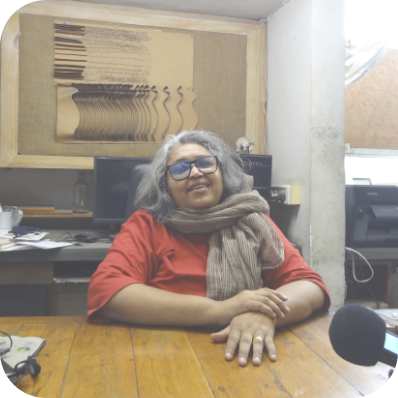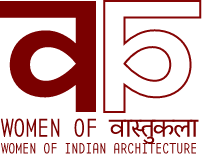
Falguni Desai
Falguni Desai is an architect who graduated from CEPT in 1989 and has been practicing in Surat since then. She was also a director at the Laxmi Institute of Architecture, Sarigam in Gujarat. She has also been the convener of INTACH Surat and a trustee with TAPI Trust which organizes “Tapi Utsav” a city festival.
INTERVIEWEES
Falguni Desai
Early education, gender in architecture, and professional journey
Early education, gender in architecture, and professional journey
Summary:
Falguni Desai begins the conversation by immediately addressing the role of gender in her vocation and how things would have been different had she been a male architect. She notes the support her father provided her while pursuing architecture but mentions that maybe she would have pushed herself harder as a male professional. She also remarks on the challenge of being a part of the builder circuit, especially for women practitioners. She describes working with government bodies and facing a struggle there as well. Interestingly, she also recognizes a kind of independence she was afforded to pursue whatever she wanted, which she feels men can’t, because of the societal pressure of having to run and provide for a family.
She then goes back to her younger days, when she was beginning to wonder what she wanted to study and notes how she wanted to get away from her native city. Since one of her cousins had married an architect, and the course was available away from Surat, she decided to enrol into CEPT University. She then goes on to describe the amazing journey and excitement of studying there and everything she learned along the way. Describing her professional journey, she lists a few projects that she worked on and described the pace of work that she undertook. She then goes on to describe her engagements with and against the government, some strong positions she took against riverfront projects, and creating awareness on heritage and resources. In 2014, she became the Director of the Laxmi Institute of Architecture, and more recently, she undertook a masters course on landscape design. Subsequently, she goes a bit more in detail about her professional engagements in recent years, client relationships, and her evolving approach towards design and building. She also mentions her engagement with the Tapi Utsav in Surat and continued collaborations with students and colleagues.
She then goes back to her younger days, when she was beginning to wonder what she wanted to study and notes how she wanted to get away from her native city. Since one of her cousins had married an architect, and the course was available away from Surat, she decided to enrol into CEPT University. She then goes on to describe the amazing journey and excitement of studying there and everything she learned along the way. Describing her professional journey, she lists a few projects that she worked on and described the pace of work that she undertook. She then goes on to describe her engagements with and against the government, some strong positions she took against riverfront projects, and creating awareness on heritage and resources. In 2014, she became the Director of the Laxmi Institute of Architecture, and more recently, she undertook a masters course on landscape design. Subsequently, she goes a bit more in detail about her professional engagements in recent years, client relationships, and her evolving approach towards design and building. She also mentions her engagement with the Tapi Utsav in Surat and continued collaborations with students and colleagues.
Practitioner:
Falguni Desai
Interviewee:
Falguni Desai
Interviewer:
Ishita Shah
Duration:
00.46.20
Mode:
Offline
Date:
27/02/2022
Language:
English, Hindi, Gujarati
English, Hindi, Gujarati
Highlights:
(00:00:33) Gender as an issue in architecture, (00:04:11) Experience with the government tourism project, (00:24:24) Legal battles with the government, (00:26:34) Website named "I am guilty", (00:32:12) Setting up a new architecture school, (00:39:59) Tapi Utsav city festival Chamber of Commerce
(00:00:33) Gender as an issue in architecture, (00:04:11) Experience with the government tourism project, (00:24:24) Legal battles with the government, (00:26:34) Website named "I am guilty", (00:32:12) Setting up a new architecture school, (00:39:59) Tapi Utsav city festival Chamber of Commerce
Surat, its architectural history, and current engagements within the field
Surat, its architectural history, and current engagements within the field
Summary:
Falguni Desai begins the session by mapping out the evolution of her design approach and practice from her earlier days in the profession to her current methodology, which she notes was always needing validation as well. She comments on how she learned to accommodate client requirements, costs, and aspirations with that of her own over time, since every client expects a certain level of work that they can conveniently afford and manage. On the topic of working with builders, she notes how certain design approaches can be evolved apart from simply working on commercial grounds, especially by catering to local community’s requirements. On working with engineers, she remarks that the process can be smoother. She talks about Surat as a city, and the state of heritage and development in the region. She then speaks about influential architects she looked up to after the post-independence era, and how the landscape of architectural projects changed after the 1980s. She also mentions the corruption and black market businesses in the field. She also details the culture of business in Surat from the 1950s onwards and how it has sustained a fascinating culture around communities rooted in one or the other businesses, and how they continue to support each other despite challenges.
She then goes on to mention the names of certain eminent practitioners who she can recall because of their work being recognized, wherein the names of women architects remain scarce. She recalls brief interactions and engagements with some of these practitioners and shares details about the same. She then goes on to talk about the heritage of early practitioners within the city, their collections and personal houses, as well as their documented legacy. She then talks about some of her current ongoing projects and engagements, and how she is continuing her practice.
She then goes on to mention the names of certain eminent practitioners who she can recall because of their work being recognized, wherein the names of women architects remain scarce. She recalls brief interactions and engagements with some of these practitioners and shares details about the same. She then goes on to talk about the heritage of early practitioners within the city, their collections and personal houses, as well as their documented legacy. She then talks about some of her current ongoing projects and engagements, and how she is continuing her practice.
Practitioner:
Falguni Desai
Interviewee:
Falguni Desai
Interviewer:
Ishita Shah
Duration:
00:45:46
Mode:
Offline
Date:
27/02/2022
Language:
English, Hindi
English, Hindi
Highlights:
(00:01:02) Practice with builders, (00:08:20) Policy suggestions for ecological conservation, (00:19:06) Informal economic structure in Surat, (00:20:45) Practice based on trust, (00:33:52) Co-living apartment Dhavalgiri
(00:01:02) Practice with builders, (00:08:20) Policy suggestions for ecological conservation, (00:19:06) Informal economic structure in Surat, (00:20:45) Practice based on trust, (00:33:52) Co-living apartment Dhavalgiri
Building an educational institute and insights into education
Building an educational institute and insights into education
Summary:
Falguni talks about the pedagogy, teaching approach, curriculum and environment of the new institute where she was the acting Director. She comments on the administrative decisions of conducting entrance examinations and allowing certain streams to gain admission, and how she pushed for an entry-for-all policy. She also delves in detail about the relationship she cultivated with her students and the discussions that followed. Focusing on a student-response approach, she notes how the curricula usually followed a more pragmatic and hands-on teaching method, and how they developed research-based thesis instead of design. She notes how they tried to create a more rooted and holistic learning environment in the institute. Talking about the admission criteria set by National Aptitude Test in Architecture (NATA), she heavily critiques the organization’s approach towards building careers and notes how they have lost the point of teaching. She also speaks of closing up the institute at this point and her continued struggles with education.
Practitioner:
Falguni Desai
Interviewee:
Falguni Desai
Interviewer:
Ishita Shah
Duration:
00.22.52
Mode:
Offline
Date:
27/02/2022
Language:
English
English
Highlights:
(00:00:24) Setting up a new architecture school, (00:07:32) Design versus research thesis, (00:14:59) Forcing educators to do masters
(00:00:24) Setting up a new architecture school, (00:07:32) Design versus research thesis, (00:14:59) Forcing educators to do masters
